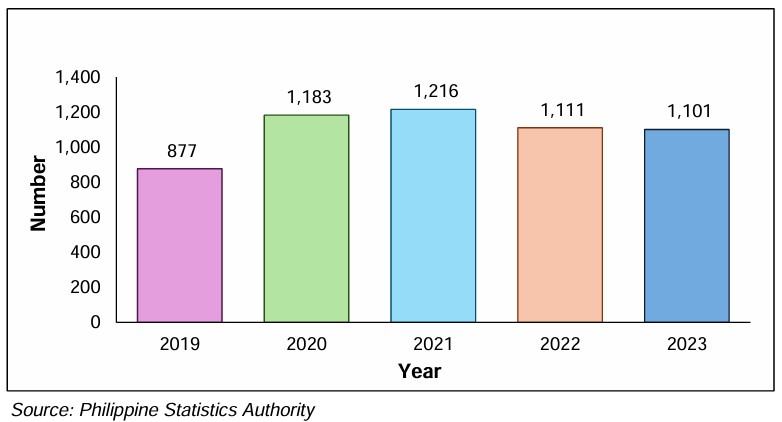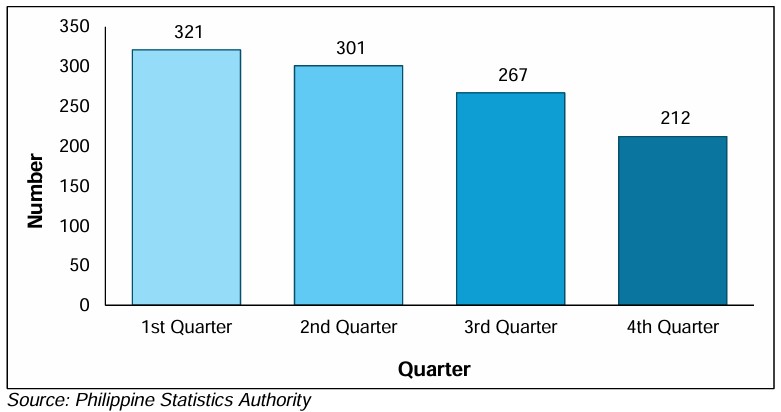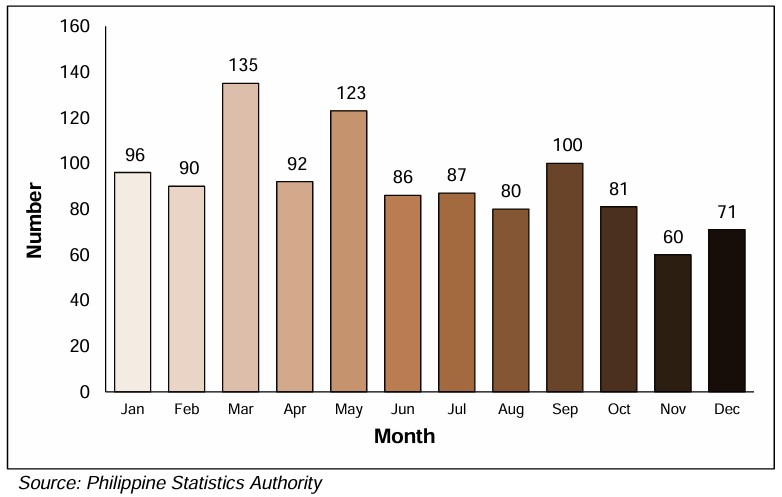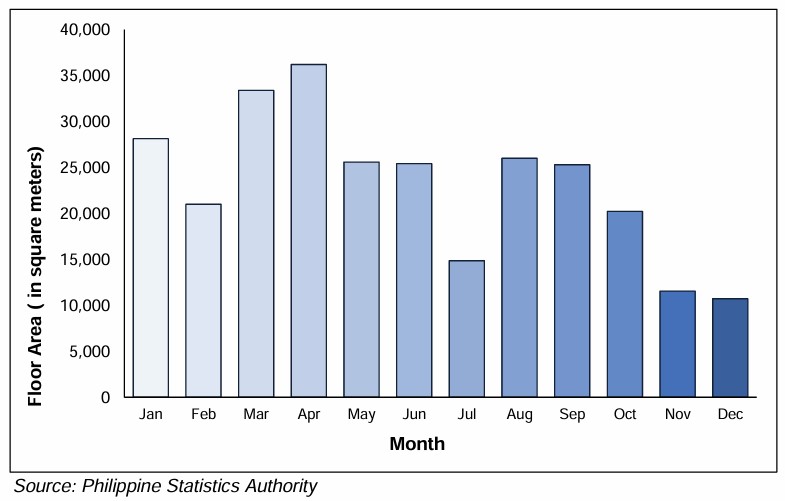SPECIAL RELEASE
Oriental Mindoro Building Construction Statistics Annual 2023 (Preliminary Results)
Number of Approved Constructions
The total number of constructions in Oriental Mindoro for 2023 was recorded at 1,101, slightly lower than the 1,111 recorded in 2022. The highest number of approved constructions during the period from 2019 to 2023 was recorded in 2021 with 1,216. On the other hand, the lowest number of approved constructions occurred in 2019, with a total of 877. (Figure 1)
Figure 1. Number of Approved Building Permits for Construction by Year, Oriental Mindoro: 2019 – 2023

By type of construction, non-residential constructions posted the most number of approved constructions in 2023, with 608 permits or 55.2 percent of the total. Residential constructions were counted at 407 (36.9 percent of total construction) while additions, alterations, and repairs totaled 86, making up 7.8 percent of total construction.
Figure 2. Number of Approved Building Permits for Construction by Quarter, Oriental Mindoro: 2023

In 2023, the highest number of approved constructions was recorded in the first quarter, with 321 approvals while the lowest was recorded in the fourth quarter, with 212 approved constructions. The second and third quarters of 2023 recorded 301 and 267 approved constructions, respectively. (Figure 2)
Figure 3. Number of Approved Building Permits for Construction by Month, Oriental Mindoro: 2023

Of the 1,101 approved constructions in 2023, the month of March recorded the highest number with 135 approvals or 12.3 percent of the total. On the contrary, the month of November recorded the fewest approvals, with 60, or 5.4 percent. (Figure 3)
Value of Approved Constructions
Figure 4. Value of Approved Building Permits for Construction by Month, Oriental Mindoro: 2023

In 2023, the total value of construction of Oriental Mindoro was estimated at PhP 3,158.12 million. The month of April recorded the highest construction value at PhP 474.46 million while November recorded the lowest at PhP 117.28 million. (Figure 4)
Non-residential buildings accounted for the largest share, with a total value of PhP 2,225.93 million, representing 70.4 percent of the total value of construction in the province.
Residential buildings contributed Php 826.19 million, or 26.2 percent of the total value. Addition to existing structures contributed PhP 38.90 million (1.2 percent of the total); alterations and repairs amounted to PhP 67.08 million (2.1 percent). Street furniture, landscaping, and signboards contributed an additional PhP 41.34 million.
Floor Area of Approved Constructions
The total floor area of approved building constructions in Oriental Mindoro for 2023 was estimated at 278,371 square meters. The month of April recorded the largest cumulative floor area with 36,206 square meters, while December had the smallest, with 10,717 square meters. (Figure 5)
Figure 5. Floor Area of Approved Building Permits for Construction by Month, Oriental Mindoro: 2023

In 2023, approved non-residential buildings in the province accounted for 203,492 square meters or 73.1 percent of the total floor area of construction. On the other hand, residential buildings for construction accounted for 69,580 square meters or 25.0 percent of the total floor area, while additions to existing structures comprised 5,299 square meters, or 1.9 percent.
Table 1 Number, Floor Area and Value of Constructions by Type and by Month, Oriental Mindoro: 2019 - 2023

Table 1 Number, Floor Area and Value of Constructions by Type and by Month, Oriental Mindoro: 2019 - 2023 (concluded)

(SGD) CHARLYN ROMERO-CANTOS, PhD
(Chief Administrative Officer)
Officer-in-Charge
Oriental Mindoro Provincial Statistical Office
TECHNICAL NOTES
The Philippine Statistics Authority (PSA) stands as the primary statistical authority tasked with the collection, compilation, analysis, and dissemination of statistical information. Construction statistics play a pivotal role in understanding the pulse of economic development and urban growth within the Province of Oriental Mindoro. As a vital component of economic indicators, these statistics offer valuable insights into the trajectory of the construction sector, which serves as a cornerstone of infrastructure development and societal progress.
Construction statistics from approved building permits aim to provide monthly administrative-based data on building constructions at the municipality level nationwide. Statistics generated are the following:
1. number of units/buildings
2. floor area of the buildings
3. types of construction
4. value of construction
The statistics cover various aspects of construction, including new constructions, renovations, alterations, demolitions, and additions to existing structures.
DEFINITION OF TERMS
The definition of terms is adopted from the Revised and Updated IRR of the National Building Code.
Building permit is a written authorization granted by the LBO to an applicant allowing him to proceed with the construction of a specific project after plans, specifications, and other pertinent documents have been found to be in conformity with the National Building Code (PD 1096).
Building refers to any independent, free-standing structure comprised of one or more rooms or other spaces, covered by a roof and enclosed with external walls or dividing walls, which extend from the foundation to the roof.
Construction refers to all on-site work done from site preparation, excavation, foundation, assembly of all the components and installation of utilities, machineries, and equipment of buildings/structures.
Residential building is a building for which its major parts or more than half of its gross floor area is built for dwelling purposes. This type of building can be of the single type, duplex, apartment and/or accessoria, and residential condominium.
Single house is a complete structure intended for a single family or household, i.e., bungalow, 2-storey house, nipa hut, etc.
Duplex house is a structure intended for two households, with complete living facilities for each; it is a single structure divided into two dwelling units by a wall extending from the floor to the ceiling.
Apartment is a structure, usually of two storeys, made up of independent living quarters, with independent entrances from internal walls and courts.
Accesoria is a one or two-floor structure divided into several dwelling units, each dwelling unit having its own separate entrance from the outside.
Residential condominium is a structure, usually of several storeys, consisting of multiple dwelling units.
Other residential construction consists of school or company staff houses, living quarters for drivers and maids, and guardhouses.
Non-residential buildings include commercial, industrial, agricultural, and institutional buildings.
Commercial buildings refer to office buildings and all buildings which are intended for use primarily in wholesale, retail, and service trades; i.e., stores, hotels, restaurants, banks, disco houses, etc.
Industrial buildings are buildings used to house the production, assembly, and warehousing activities of industrial establishments; i.e., factories, plants, mills, repair shops, machine shops, printing press, storage plants, electric generating plants.
Institutional buildings are buildings which primarily engaged in providing educational instructions and hospital/health care; ports, airports and other government buildings; i.e., schools, museums, libraries, sanitaria, churches, hospitals.
Agricultural buildings are buildings used to house livestock, plants, and agricultural products such as barns, poultry houses, piggeries, stables, greenhouses, and grain mills.
Other non-building constructions include cemetery structures, street furniture, waiting sheds, communication towers, etc.
Addition refers to any new construction which increases the height or area of an existing building/structure.
Repair is a remedial work done on any damaged or deteriorated portion/s of a building/structure to restore its original condition.
Renovation is any physical change made on structures to increase their value and quality.
Alteration is a construction in a building/structure involving changes in the materials used, partitioning and location/size of openings, structural parts, existing utilities, and equipment but does not increase the overall area thereof.
Conversion is a change in the use or occupancy of structure or any portion thereof, which has different requirements.
Demolitions refer to the systematic dismantling or destruction of a building/structure, in whole or in part.
Street furniture are street structures consisting of monuments, waiting sheds, benches, plant boxes, lampposts, electric poles, and telephone poles.
Floor area of building refers to the sum of the area of each floor of the building measured to the outer surface of the outer walls including the area of lobbies, cellars, elevator shafts, and all communal spaces in multi-dwellings. Areas of balconies are excluded.
Total value of construction refers to the sum of the cost of building, electrical, mechanical, plumbing, and others. The value is derived from the approved building permit and represents the estimated value of the building or structure when completed.

